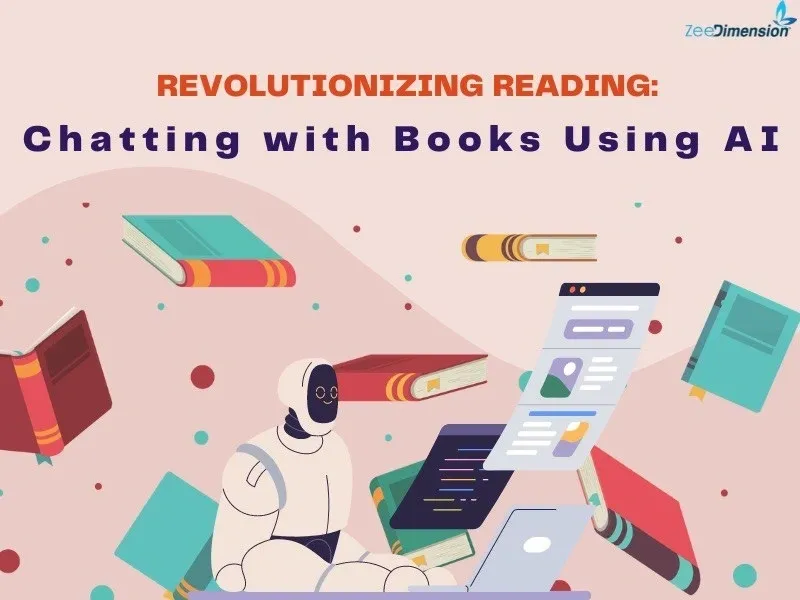
AI is here to stay, like it or not. Or so we’re being told over and over. We need to give the task at hand great thought as we step into a new era of reading. The future of books is greatly influenced by the role you will play as a reader.
4 ways AI turning passive reading into an interactive and dynamic:
-
Interactive Q&A: AI-powered tools let readers ask questions and receive answers directly from the text, making it easier to explore themes and concepts in greater detail.
-
Personalized Insights: With AI platforms, users can upload books and documents, ask questions, and get responses tailored to their specific interests.
-
Enhanced Understanding: AI tools provide deeper insights, helping readers grasp complex ideas and themes more effectively.
-
Engaging Discussions: AI services facilitate dynamic discussions about the book, offer explanations, and even allow readers to interact with characters, creating a more immersive reading experience.
Artificial intelligence offers remarkable capabilities for interacting with books and other texts. For instance, with a book like The 48 Laws of Power, you can ask AI to explain a specific law, such as Law 20. If the explanation isn’t clear, AI can summarize it or provide examples, ranging from complex historical references to simpler, everyday scenarios. Additionally, AI can translate content into various languages, generate articles based on your input, and compare themes across multiple books. It also helps with tasks like summarization, grammar, and spelling checks, and can even analyze PDFs or provide information from pre-loaded texts in its database.
How Does AI Chatting with Books Work?
Artificial Intelligence conversing with books functions by using Natural Language Processing (NLP) to comprehend and engage with the content. It facilitates a real-time conversation between the reader and the content by answering queries, summarizing chapters, and providing deeper insights. This enhances the reading experience by allowing readers to investigate themes, make sense of complicated concepts, and get customized answers.
Unlocking “Dark Data” in Literature
AI is revolutionizing literary analysis by revealing textual hidden meanings. It looks for reoccurring themes and stylistic patterns, analyzes sentiment to uncover character growth and mood, and highlights influences and references by comparing different works. In-depth character analysis, intricate theme exploration, and integration of historical and cultural background are all features of AI. AI is a useful tool for deeper comprehension because of these capabilities, which give readers and academics fresh perspectives on how to analyze and value literature.
7 Ways To Enhance Learning Outcomes With AI:
📷
1- Personalized learning: Using performance data, AI customizes instructional materials to each student’s needs and learning preferences.
2- Automating Administrative Tasks: Teachers can concentrate more on teaching when grading, scheduling, and record keeping are automated by AI.
3- Enhanced Engagement: Artificial intelligence (AI) tools produce interactive experiences that make learning fun and approachable, such gamified surroundings and virtual labs.
4- Support for Diverse Learning Needs: AI offers tailored support, such as speech-to-text and adaptive learning platforms, to students with disabilities.
5- Real-Time Feedback: AI provides students with instant feedback, assisting them in recognizing errors and enhancing their comprehension.
6- AI supports teachers by evaluating student performance and making recommendations for changes that will improve learning outcomes.
7- Lifelong Learning: AI supports skill development for students of all ages by facilitating ongoing education through adaptable online courses and virtual instructors.
Personalized Reading Experience
AI customizes insights and explanations to each reader’s specific requirements and tastes. It changes the way readers engage with texts by taking into account their unique backgrounds and understanding levels. This personalization encourages a closer bond with the subject matter in addition to making difficult concepts more approachable. Readers are thus able to interact more meaningfully with books and information due to their enhanced enjoyment and comprehension.
What is the future of books and reading in the times of AI?
We might witness the emergence of personal AI reading assistants as AI technology develops. These friends may serve as discussion guides or instructors, offering us in-the-moment advice based on our understanding and preference levels.
To improve comprehension, they can draw attention to important ideas, provide background information, and recommend relevant readings. If readers find it difficult to understand lengthy portions, the AI might ask thought-provoking questions or simplify explanations, transforming reading into a conversation.
Additionally, these friends would adjust to each learner’s unique learning preferences and emotional states, assisting as required—for example, consoling during trying times. All things considered, the use of AI in reading could make the experience more engaging, tailored, and enlightening.
To sum up, AI is more than just a tool; it signifies a change in the way we think about reading. By actively taking part in this change, we may use AI to enhance our literary experiences and make reading more dynamic, interesting, and educational.







